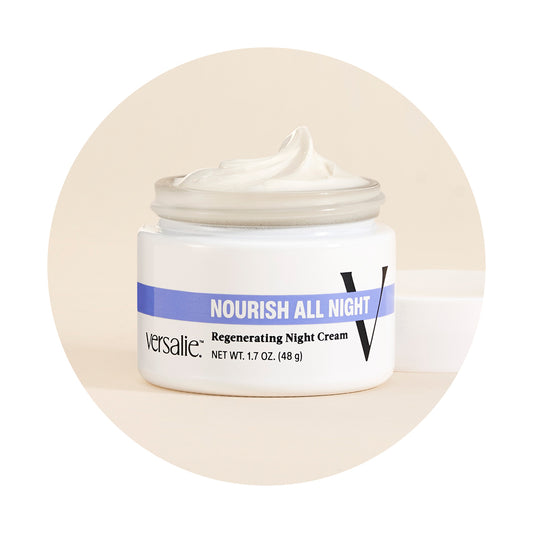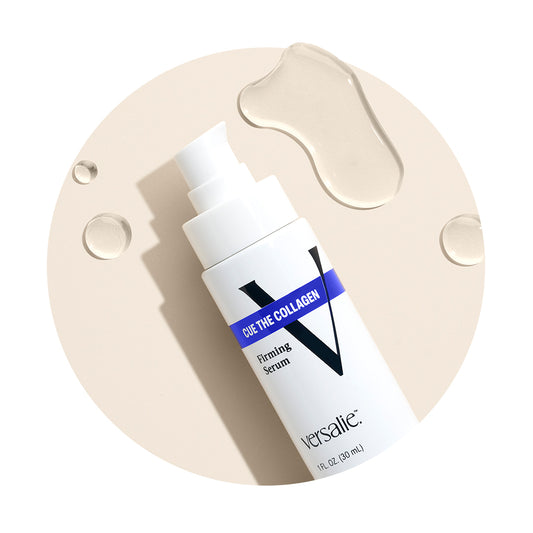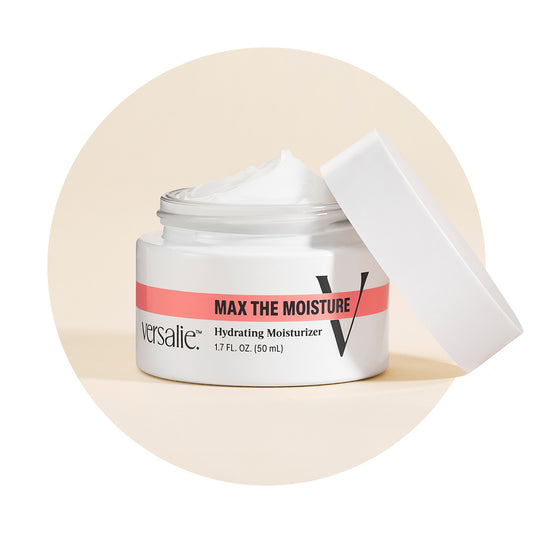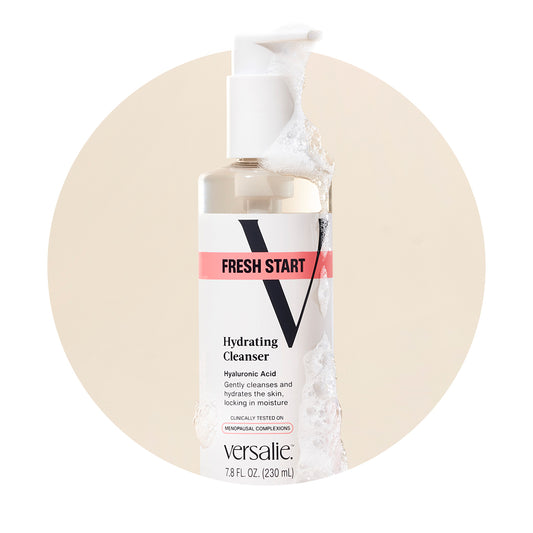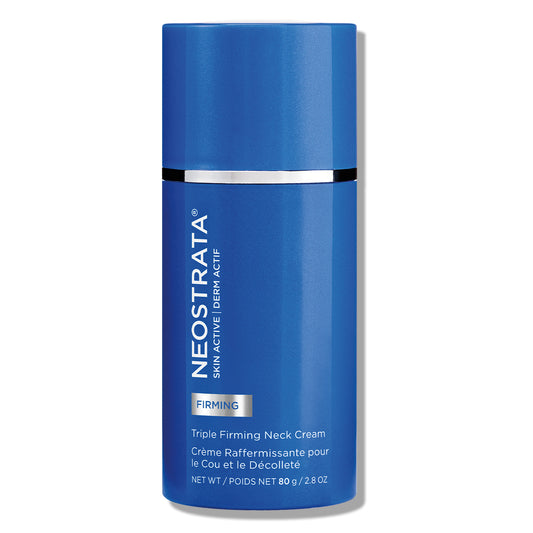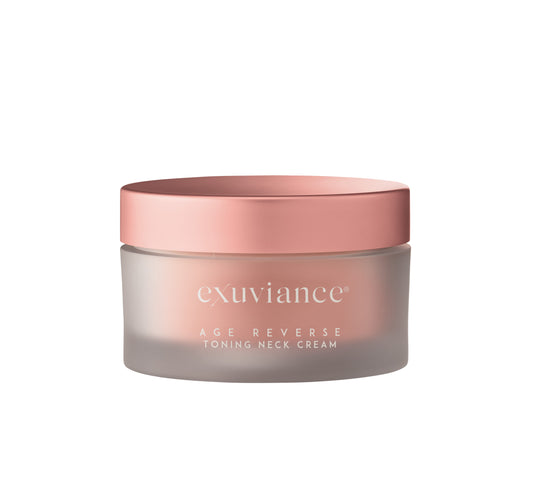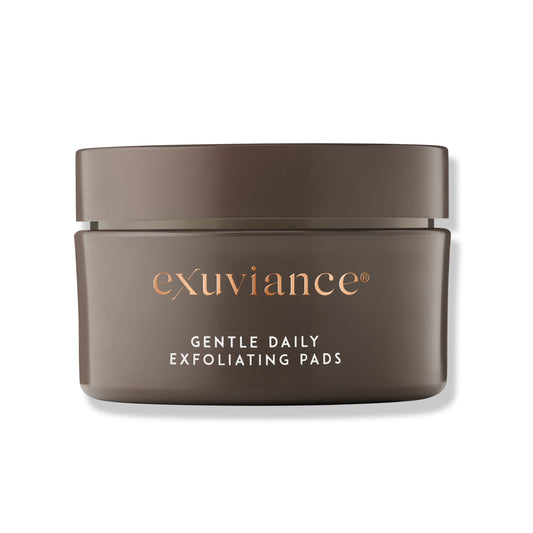Can menopause cause acne?
While we associate acne with our teenage years, it can show up again as adults, especially during perimenopause and postmenopause. And if you're experiencing acne, it's not just you — 17% of females ages 40-56 say they're getting breakouts.* And then it drops down to 7% for those ages 57-65.*
There are several reasons acne can appear during perimenopause, but changing levels of hormones are the main culprit. During perimenopause, the amount of estrogen starts to fluctuate. Androgen levels (such as testosterone) are maintained and then gradually decrease over time. So there may be a time when there's more testosterone present than estrogen. That imbalance can result in acne as the relatively higher androgen levels can trigger an increased production of sebum. Sebum is an oil that can clog pores and result in acne.
Triggers or aggravators for acne can include:
- Genetics.
- Medical disorders.
- Medications.
- Stress.
- Dietary changes.
- Lack of sleep.
- UV radiation.
- Smoking.
- Use of comedogenic (blocks pores) cosmetics.
- Sedentary lifestyle.
If you have mild acne without scarring, starting with an over-the-counter regimen can be a great start. However, if you have more severe breakouts (or have questions or concerns), you can talk to a doctor. They may check your hormone levels. They may also look for other health problems that could cause your symptoms, such as being overweight, thyroid problems, diabetes, high blood pressure, and high cholesterol. Also, they may ask about medication use, as some medications can make acne worse.
Involve your dermatologist as well if you have severe breakouts, especially if there is scarring involved. As your skin ages and estrogen levels decrease, your skin can become more sensitive and fragile. Some acne can leave scarring or changes in skin color, also called hyperpigmentation, which may affect how you feel about your appearance. Not only is taking care of your acne important for your skin but it can also help boost your emotional health.
How to treat menopausal acne
Because the changing levels of hormones can span years, menopausal acne can be an ongoing issue, so maintenance treatment is important. The way you treat your acne depends on a few things:
- How severe it is.
- How you responded to past treatments.
- Your skin tone.
- Your skin type (dry, sensitive, oily, combination, etc.).
Make an appointment with a dermatologist to find out what regimen may work best for you, and if you have any questions or concerns.

Topical therapy
When thinking about topical therapy, remember it can cause dryness and irritation. This could be a problem because hormonal changes can make the skin even drier and more sensitive. If you have older acne scars, those can become more prominent as the skin loses elasticity.
The goal of treatment is to reduce acne and the potential hyperpigmentation and scarring it can cause, without irritating the skin. Regardless of the treatment you choose, use a non-comedogenic moisturizer (won’t clog pores) in addition to the medicated treatment. This can help reduce the side effects of dry skin and irritation.
- Topical retinoids/retinols. A go-to treatment that can also improve signs of aging and sun-damaged skin. It can cause skin peeling and can make your skin extra sensitive to the sun, so sun protection is especially important. Retinoids are available by prescription only. Retinols are a type of retinoid and are available over-the-counter (OTC).
- Benzoyl peroxide. It’s antimicrobial and kills acne-causing bacteria, but it can cause irritation and dryness. You can help prevent irritation by starting at lower levels and increasing them over time. These solutions are mostly available OTC.
- Azelaic acid. Its anti-inflammatory and antimicrobial action helps regulate the cell turnover process. It can also help with hyperpigmentation caused by acne. It’s available by prescription and a version with a lower percent is available OTC.
- Dapsone. This prescription medication is antimicrobial and anti-inflammatory and can be used for extended periods of time.
- Combination therapy. Some treatments can be combined, but it’s best to talk to your doctor about what makes sense for you.
Systemic therapies
For moderate-to-severe acne, or acne that doesn’t respond to topical treatments, your doctor may prescribe oral medications to help. Anti-androgens are preferred, especially if the person is also experiencing excess, unwanted hair on their face and female pattern baldness. Oral contraceptives are effective, but depending on your age, other health conditions, and stage of menopause, the risks may outweigh the benefits. Specific menopausal hormone therapy (MHT) may be an option, depending on the type, as some can worsen acne. Antibiotics are used less often than they used to because of the rise in antibiotic resistance. In addition, antibiotics seem not to work as well in older patients. Again, talk to your doctor about what may be right for you.

Procedures
There are certain procedures that healthcare professionals can recommend to treat menopausal acne. They're often used to help prevent scarring by reducing inflammation faster, which can help prevent or reduce the number and severity of scarring.
- Comedone extraction. Comedones are the acne that appear as small, flesh-colored, white, or dark bumps that give skin a rough texture.
- Chemical peel. By using various ingredients (salicylic acid, mandelic acid, glycolic acid, retinol peels) that exfoliate the skin, chemical peels help resurface the skin. These exfoliants help slough off dead skin cells that can make the skin’s surface uneven. For sensitive, mature skin, combination peels like salicyclic-mandelic acid or lactic acid peels are especially useful. People with darker skin tones are at a higher risk of hyperpigmentation after a deep chemical peel.
- Laser and light therapy. They help reduce inflammation, decrease oil production from the sebaceous gland, and prevent the growth of C. acnes, a common bacterium on the skin.
How can I take care of my skin when I have menopausal acne?
The fluctuating levels of estrogen during perimenopause leads to a decrease in natural oils and collagen in our skin. Less oil makes the skin drier, and less collagen can make the skin feel thinner and it can feel itchier. And on top of that, you may also be experiencing menopausal acne. To help manage the potential skin issues during perimenopause, create a skincare routine that can help you avoid irritation and dryness. To care for skin with menopausal acne:
- Cleanse daily. Wash 1-2 times daily with mild soap, syndet (a type of soap made of synthetic detergents), or benzoyl peroxide face wash. If you have oily skin, you can also use salicylic acid or glycolic acid-based face washes. People with acne should avoid using face scrubs.
- Exfoliate. Exfoliation is an important part of a skincare routine. Chemical exfoliation is generally preferred to physical exfoliation. The little beads in some face scrubs can be rough on your skin. This is because it’s removing the dead, dull skin cells from the surface. Chemical exfoliation works by loosening the "glue" that’s between the dead skin to allow it to shed off easier, revealing fresher skin underneath. This typically is milder since it's targeting the cells itself and not the entire skin surface.
- Moisturize. Use moisturizer before applying any other products. Look for moisturizers with any of the following: dimethicone, glycerin, hyaluronic acid, and sodium pyrrolidone carboxylic acid.
- Protect against UV rays. Use sunscreen with an SPF of 30 or higher and avoid tanning. Look for sunscreens that are non-comedogenic and hypoallergenic.
- Don't pop or pick at acne. This can cause increased inflammation, infection, and scarring. Consider using an acne patch to help the pimple heal and protect it from being picked.
- Avoid oil-based products. Replace all old cosmetics with water-based cosmetics. Avoid using oil-based foundations and cosmetics. And be sure to wash it off before going to bed.
- Consider trying supplements. If you want to give a boost to your skincare routine, consider adding a supplement. Talk to your doctor about whether supplements are right for you.

What else can I do to reduce menopausal acne?
In addition to taking care of your skin and treating the acne, there are lifestyle habits you can try that not only affect your acne, but also improve your overall wellbeing:
- Try your best to get enough sleep. We know this can be tough with a busy schedule and other perimenopause symptoms, like night sweats, keeping you up. Sleep deprivation can lead to an increase in stress hormones — which directly influence acne.
- Try reducing your consumption of dairy. For some people, this can help reduce acne.
- Follow a healthy diet, especially focusing on reducing foods that spike your insulin (i.e., foods high in sugar). Insulin spikes lead to inflammation that can trigger acne.
- Work on following other healthy lifestyle tips like maintaining a healthy weight and not smoking.
*Data from Attitudes & Usage study conducted in August 2021 with 4,578 female participants ages 40-65. Funded by Kenvue.


